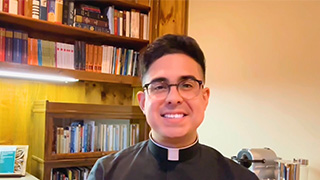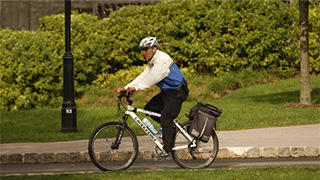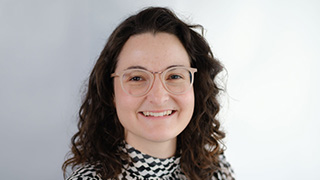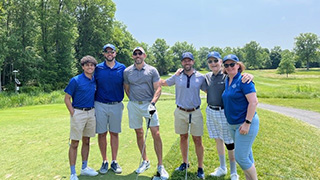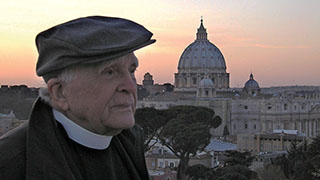Core and SHU-READS Celebrate Just Mercy
Tuesday, August 31, 2021
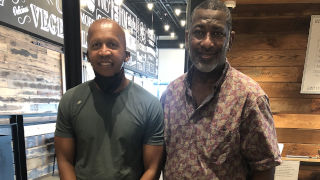
Mr. Bryan Stevenson and Dr. Jeff Garland.
Inside the Core this week, we are welcoming a record number of students (nearly 1700) to Seton Hall. We are excited! Also very exciting is the fact that Seton Hall's SHU-Reads program selected Bryan Stevenson's Just Mercy (the subject of a feature film of the same title) for all first-year students to read, so presumably nearly all these entering students will have read this book. The Core Director, Director of First Year Writing, and Center for Academic Success worked together to select this text, which will be used in Core I and English 1201 classes this fall. And, making this perhaps most exciting of all, Seton Hall is going to host Bryan Stevenson on Nov. 7, at 6 p.m., when he will address students and faculty, as well as get an honorary doctorate. The Core, along with the Law School, is co-sponsoring this important event.
The themes of justice, mercy, overcoming racial bias, community, and faith in connection with social justice link closely with those similar themes integral to the Core. The Core faculty, overall, are excited about this text, and we have been making plans for incorporating it into our classes. However, one Core faculty member, Dr. Jeff Garland, went further than this – traveling to Montgomery to visit Stevenson's Equal Justice Initiative, where he not only got to see the work going on there, but also got to meet Bryan Stevenson. At my request, he wrote about his wonderful and inspiring experience, so I will let him continue in his own words:
After watching the film "Just Mercy" in 2019 I made a personal decision that I had to visit the Equal Justice Initiative Museum in Montgomery, Alabama. My plans were delayed for a year because of COVID-19 and travel restrictions. This summer I decided the time was right to travel, and I did this past weekend. I'm a strong believer in scripture, specifically found in the book of Esther 4:13-14, "for such a time as this." I'm a very meticulous traveler and planned everything I wanted to accomplish on this trip. I departed New Jersey very early in the morning and flew to Atlanta, Georgia. Upon arriving in Atlanta, I rented a car and drove two hours to Montgomery, Alabama. I drove directly to the National Memorial for Peace and Justice. As I entered the park, I saw images of Africans in shackles and chains as they were brought to America. I cried as I began to think of the many immigrants who entered into this country via New York Ellis Island as they waved the United States flag and sailed past the statue of Liberty. In contrast, this was my ancestors' entry welcome to America. I found myself physically, emotionally, and spiritually saddened by the overwhelming memorial to lynching victims. It was at the two-hour mark that I came to the end of my visit, and I was directed by the guide to the "Memorial Square" and stood there. The memorial square is the highest point in this park and one can see a 360-degree view of all the lynchings that were documented. It took my breath away to see so many lives taken without any justice.
I traveled from the National Memorial to the Museum and New Legacy Pavilion where I emersed myself in a rich, but very brutal American history. My experience was very educational, and yet I felt traumatized by it. I say traumatized because my father shared with me as a young kid growing up in Thomasville, Georgia, he was run off the road and crashed his car while driving to Tallahassee, Florida. It also reawakened a memory of my uncle in Miami, Florida when a white mob of Miami Police officers threatened to murder him if he took the civil sergeant exam. I could not understand as a child why the National Guards appeared at my grandmother's home in a Jeep with soldiers carrying rifles as they escorted him safely downtown to take the sergeant exam and return him home. Needless to say, I found this Saturday to be very taxing emotionally and physically. I purposely wanted to end my day at the EJI onsite restaurant, Pannie-George's Restaurant. It was exactly 5:15 pm, and I looked at my watch and said what a great day this was. I wondered, what would make this visit even better? I thought, if Bryan Stevenson came in the restaurant, that would do it. I said, if he did come in, what would I say to him? If he came in the restaurant, I would simply say to him, thank you. No later than five minutes had gone by, and Bryan Stevenson walked in the restaurant. I introduced myself to him and shared that I'm an adjunct professor at Seton Hall University. He immediately stated, I'm visiting your school in November. Knowing it was the evening hour and he was in the restaurant to have dinner, I simply said, thank you for all that you have done.
Stevenson gave a talk on a YouTube Ted Talk, called "The Power of Proximity." At the 24-minute mark he mentions, "The older I get, the heavier the burden begins to weigh on me. We are so comfortable with this narrative of racial difference." His story speaks about being in the Midwest and in a courtroom. He tells how the judge enters the court room and tells Stevenson to leave because "he doesn't want defendants in his courtroom without their attorney present." Mr. Stevenson states he was dressed professionally but was automatically labeled "the defendant." He then explained to the judge that he was, in fact, the attorney. The judge and prosecutor began to laugh. Stevenson also began to laugh. He wasn't laughing because it was funny, but because he was trying to protect his client. I found this similar to Dr. Martin L. King, Jr. "I've been to the Mountaintop", when Dr. King, Jr. refers to "I can remember when Negroes were just going around as Ralph has said, so often, scratching where they didn't itch, and laughing when they were not tickled."
As Dr. Garland shows, the experience of going to the Equal Justice Initiative was powerful, inspiring, but also traumatic. The book is similar. If it does not move the reader to anger and tears, along with inspiration, there is something amiss with the reading. As Dr. Garland says, there is a deep connection in Stevenson's story with another Core I text, Dr. King's "Mountaintop Speech." Both King and Stevenson embody the values the Core represents.
Dr. Jeff Garland is a licensed ordained Baptist minister, endorsed by the American Baptist Churches, USA for more than 20 years. This is his 21st year working as a Board Certified Chaplain (BCC) and Palliative Care Hospice Advanced Certification PCHAC) with the Association of Professional Chaplains. This is his 23rd year working at Seton Hall University as an Administrator in Public Safety & Security. He is now entering his 4th year as an adjunct faculty member teaching in the CORE, both Journey of Transformation and Christianity and Culture in Dialogue. He received his Doctor of Ministry from Drew University School of Theology and his Educational Specialist (Ed.S) degree in Marriage and Family Therapy from Seton Hall University. A graduate of The Department of Justice - Quantico Virginia, Dr. Garland is a former Special Agent with the Federal Bureau of Investigation.
We are so grateful to have a faculty member like Dr. Garland teaching in the Core, and I am sure his experiences in Montgomery, especially meeting Bryan Stevenson, will enrich his classes in a unique and meaningful way. Thank you, Dr. Garland, for sharing them with us!
Categories: Faith and Service

